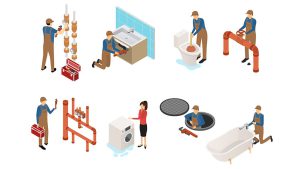Top Skills Every Plumber Needs to Master
Top Skills Every Plumber
Plumbing is an essential skill that keeps modern society running smoothly. It involves a lot of hands-on work, including installation, repair and maintenance, and often requires specific technical abilities like understanding hydronics, tools, math, and interpreting blueprints. In addition, plumbers also need good communication and customer service skills to ensure a positive experience for their clients.
The most important skill for any plumber to have is their ability to troubleshoot and solve problems. This can include identifying the source of a leak, resolving blockages, or even diagnosing why a water heater isn’t heating properly. In all of these instances, a skilled plumber will be able to think critically about the situation and come up with effective solutions quickly.
Another necessary skill for plumbers is their physical strength and stamina, as well as their manual dexterity. The nature of plumbing work can be dangerous at times, and plumbers are often required to lift heavy objects or operate in tight spaces for extended periods of time. They also need to be able to handle sharp tools and equipment, so having a strong grip and steady hands is essential for the job. In addition, some plumbers work in residential settings where they are required to wear protective gear and adhere to strict safety protocols.
Since plumbing is often an emergency service, plumbers must be able to communicate effectively with their customers and provide clear estimates and instructions for how to fix the issue. This requires strong interpersonal skills, as well as the ability to listen attentively and answer questions thoroughly. This is particularly important for plumbers who are self-employed, as they may need to communicate with multiple clients throughout the day.

Top Skills Every Plumber Needs to Master
Plumbers must also have good organizational skills to keep track of their work schedule, appointments, and materials. Whether they are working in an office or on-site at a client’s home, it is important for them to be able to manage their time efficiently so that they can complete all of their tasks by the scheduled date. This includes being able to accurately estimate how long it will take them to complete each task, so they can plan accordingly and provide their clients with accurate turnaround times.
As a plumbing professional, you’ll need to understand basic mechanical principles like how pipes are installed and connected, as well as the local codes and regulations that apply to various types of jobs. You’ll also need to have good math and physics skills to calculate measurements, determine the best way to fix a problem, or figure out how much material is needed for an installation. In addition, being able to read and interpret blueprints is helpful for knowing where pipes will go in a new building or renovation. Lastly, good computer literacy is important for maintaining records and submitting paperwork for projects. You should be able to use word processing and spreadsheet programs as well as any industry-specific software or tools you might need for your job.
Adherence to local building codes and regulations is a non-negotiable aspect of plumbing. These codes are in place to safeguard public health and ensure that plumbing systems meet safety standards. Plumbers must be well-versed in these regulations and incorporate them into their work.